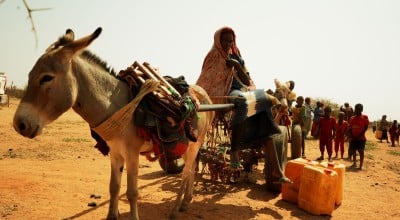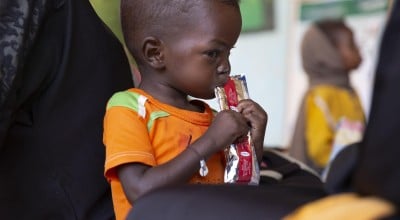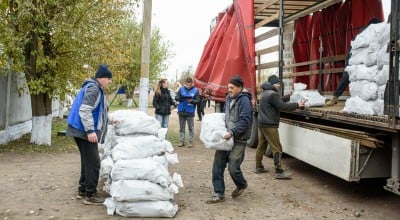
Read our 2024 annual report

Knowledge Hub
Today marks three years since the Rohingya people fled violence and persecution in Rakhine State in Myanmar. An estimated 730,000 refugees have crossed into Cox’s Bazar in Bangladesh to find safety and security. While the majority of Rohingya people wish to return to their villages once safe to do so, there has been little progress in establishing a basis for their return.
The challenges facing the Rohingya people, described by the United Nations as “the most persecuted minority in the world, have unfortunately continued following their arrival in Bangladesh. The densely populated camps pose a threat of flooding and landslides during the annual monsoon season, with torrential rains falling in the area in July.
COVID-19 is another major issue, with the first outbreak confirmed in the camps in June and five deaths reported thus far. Despite all this, Concern’s Emergency Director in Bangladesh, Heather Macey says that the mood among the Rohingya community in Bangladesh is one of resilience and defiance.
“They are people before they are refugees. You have doctors and musicians and artists living in these camps. You can't forget that. The people have gone through and survived so much,” she explained.
“They are the drivers of their own change. Despite lack of formal education and lack of training, there's still hope. The people are not hopeless.”
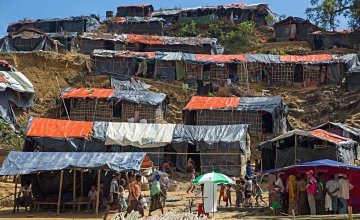
How it all began
The Rohingya represented the largest group of Muslims living in Myanmar at the start of 2017, with the vast majority of more than one million residents in Rakhine State. Regarded as ‘stateless’ by the government within Myanmar and denied citizenship, the ethnic group had been forced to leave Myanmar in a number of displacements prior to 2017.
In August of that year, reports began to emerge of forces making their way through Rohingya villages in Rakhine State, burning homes, and attacking and killing civilians. Hundreds of thousands of Rohingya began their journey to the Bangladesh border, risking their lives to reach the safety of another country.
Now, more than a million Rohingya refugees in Bangladesh live in 34 camps close to the seaside village of Cox’s Bazar. The camps are overwhelmed with the huge influx of people, with an estimated average population of 100,000 people per square mile. About half of the refugees are children, with more women living in the camps than men. Most of the refugees live in shelters made of bamboo and plastic sheets - structures that are unbearably hot in the height of the summer and extremely vulnerable to the winds and rain of monsoon season.
The Rohingya are not allowed to work and cannot leave the camps without the permission of the Government. However, many have taken on volunteer roles within the camp to help improve conditions for themselves, their children, and their community.
Concern’s initial response
Concern had been working in Bangladesh for 45 years when the first reports of the mass exodus from Rakhine State emerged in 2017 and it rapidly became that this was a major humanitarian crisis. In our initial response, we provided food rations, water and shelter to more than 100,000 newly arrived refugees.
Three years later, we continue to support these communities and work to ensure lifesaving nutrition support for children, pregnant, and breastfeeding women. Much of Concern’s work in Cox’s Bazaar is done by volunteers, made up of an almost equal number of the host population and Rohingya refugees. Host communities, including poor Bangladeshi families living in the area around the refugee camps, have also struggled with this crisis – with rising costs of living and loss of land traditionally used for farming.
To ensure that all communities are supported and alleviate tensions between the groups, Concern’s livelihood interventions have been expanded to include these populations.
"Bangladesh has done an amazing job support the Rohingya people at such a large scale but it comes as a cost to the host community, which also needs to be supported,” said Ms Macey.
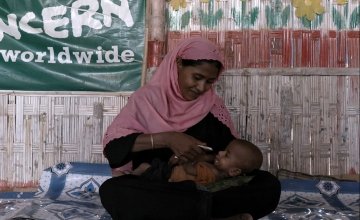
Fleeing for safety
Mother-of-six Reshma* was one of the thousands who fled Rakhine State. She and her family found safety in Cox’s Bazaar, but life has never been the same.
I had heard stories about what the military were doing. But I hadn’t experienced any of that until one day they came to our village and started to burn homes. They destroyed my house. We all fled together – up to 500 of us. We walked for twelve days to the river. I felt terrible.
“My sister lived in a different village. I didn’t know if she was safe or not. One day, as we were making our way to the border, I saw her on the road and we were reunited,” she said.
“We had a small amount of food with us and shared it out among the community. But everything had run out by the final two days, and we were left with nothing. So, we swam across the River Naf and ended up at the camp.”
Since starting their life in the camp, Reshma’s sister died during childbirth. Reshma adopted baby Tahira*, but the newborn was soon diagnosed with acute malnutrition.
“After I adopted Tahira, I had to rely on powdered milk for her. But it was difficult to afford. She became malnourished and was admitted to the hospital. After that, she was admitted to Concern’s nutrition centre and is receiving peanut paste as a form of therapeutic food. The help we’re getting from Concern means that the baby’s health is improving. Her appetite is increasing and she is gaining weight.
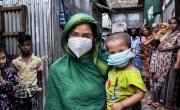
COVID-19 in the camps
In the early days of the COVID-19 crisis, there were strong fears that once the virus reached the refugee camps, it would lead to tens of thousands of deaths. Given the density of the population in Cox’s Bazar, social distancing was seen as a major challenge. However, while 75 cases have been confirmed, the outbreak had largely been contained and Macey attributes this to early prevention measures.
These included the cancellation of most flights into Bangladesh and the introduction of strict 14-day isolation in hotels for those who arrived in the country. Access into the camps was also strictly monitored, which helped prevent a spread of COVID-19 for months and allowed time to ensure teams and health centres were prepared for what might come. “We said in April that it wasn't possible for us to keep the distance here, but we now have very good physical distancing in all of our sites. Green circles mark where people can sit and distance and they’re becoming more common across camps,” said Ms Macey.
The battle with COVID-19 is far from over but Macey added that the infrastructure is now in place to deal with the situation is cases rise within the camps. “A lot of preparation was done when we thought the numbers would be as large as expected. The measures that the Bangladesh Government put in place enabled a lot of preparation to be done, with work from the UN and NGOs. Even though now those numbers haven't come to pass, we have put in place a robust system to deal with rising rates.”
At the core of Concern’s COVID-19 prevention programming was ensuring that vulnerable populations are kept informed of how they can keep themselves and their families safe. It was important that this information was provided through either audio or visual methods since literacy rates in the camp are low. Flashcards with COVID-19 prevention methods were produced and radio programmes in the Rohingyan language were produced. These proved very successful in keeping the virus from spreading.
Weather-proofing the camps
Monsoon season and cyclones have often caused major panic for the humanitarian sector in Bangladesh. In September 2019, monsoon rains flooded large parts of a camp, forcing thousands to relocate.
Earlier this year, there were strong concerns that Cyclone Amphan - a powerful and deadly tropical cyclone - would cause havoc in Cox’s Bazar. Although it caused severe damage along the Bangladesh coast, it , fortunately, did not affect the Rohingya camps. Work has also been ongoing to improve the structural integrity of buildings in the camps to ensure that they can less vulnerable to the threats posed by the monsoon season.
There are also strategic storm warning systems in place, as well as cyclone shelters for refugees and those who work in the camps. There have been no major incidents of landslides in the camps this season which, according to Ms Macey, is quite incredible. “We have had a lot of rain. Now there are gales outside and it's been raining for nine days. People are wading up to their waists this week trying to get into the camp. But we have been lucky. The last few years have been lucky.
“It is commendable what the site management teams have done to make the camps safe against weather systems.”
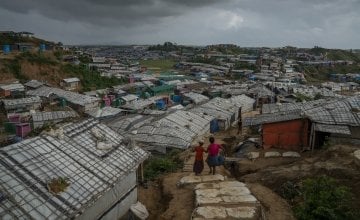
What’s next?
Despite attempts to ensure the Rohingya people’s safe return to their home country, there is no end in sight for this crisis. Last year, Concern joined 60 other local, national and international NGOs in calling for human rights for all to be recognised in Rakhine State and for Rohingya refugees to have a role in deciding the course of their own lives, including conditions for their return to Myanmar. One year on, and it is looking less likely a peaceful solution will arrive any time soon.
Bangladesh and Myanmar have agreed to complete the return of the refugees but attempts to begin a safe and dignified repatriation process have failed as refugees refuse to go back, fearing more violence.
“Bangladesh has done an amazing job supporting the Rohingya people at such a large scale, but these camps just keep getting bigger and bigger,” said Ms. Macey.
“Sometimes I can't see a bright future, but they can. The Rohingya people hope that someday they can go back to their home and live a normal life.”
* All names have been changed for security reasons.
Follow us
Keep up to date with all of our work and hear more stories like Samer’s by following us on Instagram.



